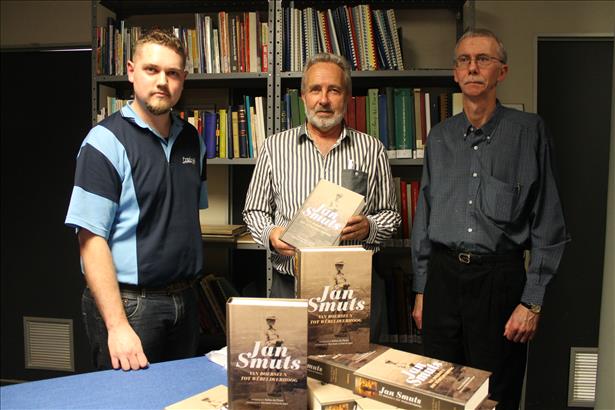Latest News Archive
Please select Category, Year, and then Month to display items
01 January 2020
|
Story Eugene Seegers
|
Photo Kaleidoscope Studios | Sonia Small
 Dr Maria Madiope took over the reins of the UFS South Campus at the beginning of January 2020.
Dr Maria Madiope took over the reins of the UFS South Campus at the beginning of January 2020.
The Council of the University of the Free State (UFS) approved the appointment of Dr Maria ‘Marinkie’ Madiope as Principal of the South Campus for Open Distance Learning (ODL) during a meeting held on 20 September 2019. Dr Madiope took over the reins of the UFS South Campus at the beginning of January 2020.
Educator at heart
Educating and empowering others are key aspects of Dr Madiope's life. She has served as the Director for University Teaching and Learning at Unisa since 2015 and takes her role incredibly seriously, achieving a transformative curriculum at the colleges under her care since her appointment.
Dr Madiope holds a PhD in Education from Unisa, with a specialisation in Didactics; her next two degrees where completed at the then RAU, which is today known as the University of Johannesburg: a BEd in 1999, followed by an MEd in 2001, both specialising in Computer-based Instruction. She previously obtained her BA Ed in 1985 and a BEd in 1988 from the University of the North. Her initial training as a teacher was from the Hebron College of Education from 1980-81.
Dr Madiope is also the editor of the only journal in ODL, Progressio, since 2016. Her expertise in E-learning is another of her strong points. Together with her team, Dr Madiope designed and developed the first online course in Curriculum Transformation, which is being piloted at Unisa. Her work has been rewarded with awards such as the Unisa Gender Activism: Advocacy and Promotion of Women’s Rights 2013, Unisa Woman of the Year 2013, and Unisa Best Performer 2013.
Dr Madiope brings with her a wealth of experience to UFS and her vision is to increase access to a wider base of learners with potentially having more African learners enrolled. The first point of call would be to have more learners coming from Lesotho and then the rest of the SADEC region, having the UFS become a leading distance-learning university. One of the key projects that Dr Madiope wishes to tackle is early childhood development. “I believe in educating educators to ensure that they are best equipped to provide the latest and relevant Early childhood and development practices that are on par with the rest of the world,” she says.
Community leader
In addition to being an experienced educator and administrator, Dr Madiope is instrumental in community projects that lie close to her heart. Whether it is large-scale advocacy for women’s rights or her personal involvement in the supply of sanitary towels for schoolgirls as part of a programme to empower the girl child through exposing them to options, it is humbling to watch her compassion in action.
She further intends to strengthen the relationship of the university with TVET Colleges and community colleges by providing mutually beneficial programmes that will up-skill those colleagues by giving them an opportunity to work with experienced UFS staff members. She says, “Reaching out to colleagues in TVET and Community colleges will offer them the opportunity to advance their lecturing and learning programmes, which will only lead to benefiting their learners and South Africa as a whole.”
Jan Smuts: from country boy to world stage; a reassessment
2017-11-10

At the book discussion of Jan Smuts: van boerseun tot wêreldverhoog;
'n herwaardering, were from the left: Con Robinson, Protea Bookshop;
Prof Kobus du Pisani; and Prof André Wessels from the Department
of History at the UFS.
Photo: Leonie Bolleurs
Prof André Wessels from the Department of History at the University of the Free State (UFS) was one of 20 co-authors of Jan Smuts: van boerseun tot wêreldverhoog; 'n herwaardering – a book compiled under the leadership of the general editor, Prof Kobus du Pisani, from North-West University. This unique history book deals with the different themes in the life of Smuts, rather than describing the events chronologically.
South Africans are almost afraid of their own history nowadays ... and yet another history book is being launched. Does it make sense? Yes, for two reasons.
The monster in the dark
One of the ways to overcome fear is through knowledge. The monster in the dark disappears when one understands that the street lights and tree branches are creating interesting shadows. The more one knows about something, the less scary it becomes.
The Greek Bible
This was possibly also Smuts’s approach. Knowledge was his passion, and even today he is considered as one of the best students of the University of Cambridge. Although very few people really understand his holism theory, Smuts experienced the complex world in a very simple way – as one – not as lots of different pieces functioning independently of each other.
Smuts could have made a success of any of his interest fields – law, botany, literature, and philosophy. However, politics laid three wars on his doorstep. While he is regarded as a militarist by some, he was actually a peacemaker. He played a role in the establishment of the League of Nations, and later the United Nations. Incidentally, he continued to read the Greek Bible while on commando during the Anglo-Boer War.
A colourful character
The second reason for yet another Jan Smuts history book is his fascinating humanness. Time should be spent on colourful characters such as this. It is worthwhile hearing the story of someone who had such a great impact locally and internationally – good or bad.